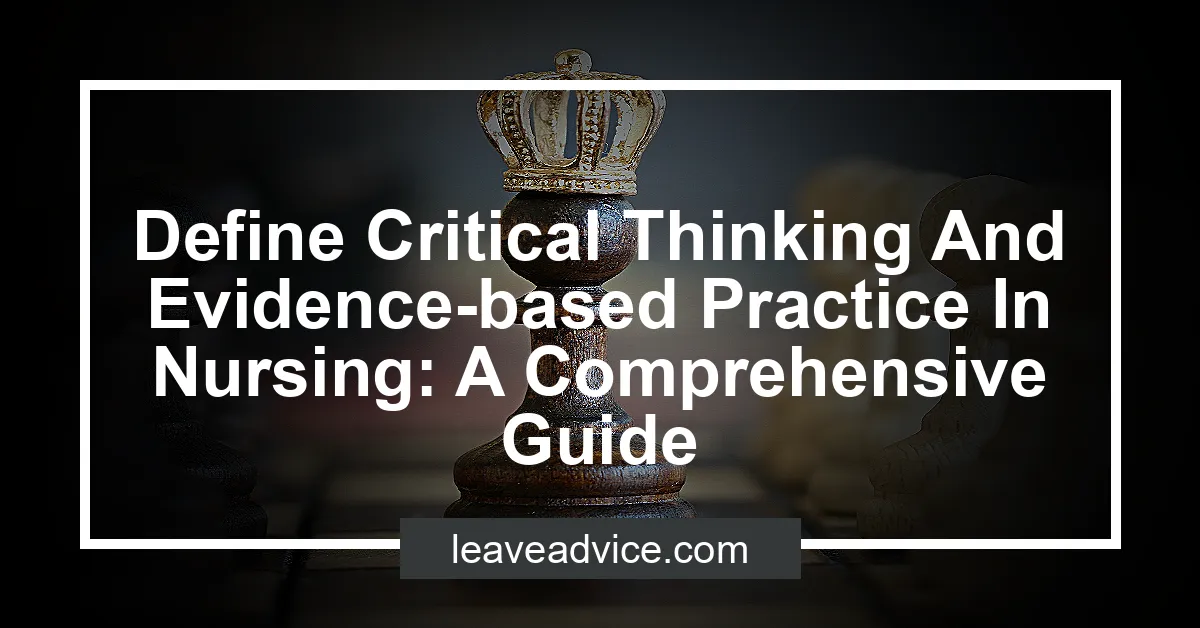Define Critical Thinking And Evidence-based Practice In Nursing: A Comprehensive Guide


Critical thinking in nursing involves the ability to analyze and evaluate information to make informed decisions and solve problems in patient care. It is an essential skill for nurses to provide safe and effective care.
Evidence-based practice in nursing refers to the use of the best available evidence, combined with clinical expertise and patient preferences, to make decisions about patient care. It helps to ensure that nurses are providing the most effective and holistic care based on the latest research and knowledge.
The importance of critical thinking and evidence-based practice in nursing cannot be overstated. They are essential for providing high-quality, safe, and patient-centered care.
By developing these skills, nurses can improve patient outcomes and contribute to the overall advancement of the nursing profession.
Check out this Youtube video: Gain a deeper understanding of critical thinking and evidence-based practice in nursing by watching “What is Evidence Based Practice?” on YouTube.
Understanding Critical Thinking in Nursing
Definition of critical thinking
In the nursing profession, critical thinking is defined as the active and skillful evaluation of information, leading to reasoned and reflective decision-making about patient care. It involves a comprehensive mental process that encompasses perception, analysis, synthesis, and evaluation of data to identify patient problems and direct clinical judgments.
The role of critical thinking in making clinical decisions
Critical thinking plays a pivotal role in making clinical decisions as it empowers nurses to analyze and interpret patient data effectively, enabling them to develop precise diagnoses and implement targeted treatment plans. It allows nurses to consider various perspectives, anticipate potential outcomes, and adapt their approach to ensure the optimal care and well-being of their patients.
Importance of critical thinking in nursing practice
Critical thinking is of utmost importance in nursing practice as it enhances the nurses’ ability to provide safe, efficient, and skillful interventions for their patients. It facilitates the identification of patient problems, aids in ethical decision-making, and contributes to the overall quality of care provided.
Moreover, critical thinking is crucial for nurses to adapt to dynamic clinical environments and deliver excellent, patient-centered care.
| Key Points |
|---|
| Critical thinking in nursing involves active evaluation and reasoned decision-making. |
| It plays a pivotal role in clinical decision-making and enables precise diagnoses and targeted treatment plans. |
| Critical thinking is essential for providing safe, efficient, and patient-centered care. |
Remember: Without critical thinking, we are only capable of scratching the surface of nursing care. With it, we can dive deep into understanding patients’ needs and deliver exceptional care.
Keep thinking critically, nurses!
Characteristics of Critical Thinkers
Analytical skills
Analytical skills in critical thinkers involve the ability to question preconceived notions, analyze data and information, conduct thorough research, and ultimately solve complex problems. For instance, a nurse with strong analytical skills can effectively assess patient symptoms, analyze medical data, and devise evidence-based treatment plans.
Open-mindedness
Critical thinkers in nursing exhibit open-mindedness by being receptive to new evidence, setting aside personal beliefs, and actively seeking different perspectives. This allows them to adapt to changing medical practices, consider alternative treatment approaches, and remain empathetic towards diverse patient needs.
Effective communication
Critical thinkers in nursing emphasize effective communication by utilizing active listening, summarizing information for clarity, and incorporating visual aids when conveying complex medical concepts to patients and colleagues. This facilitates clear interdisciplinary collaboration, patient education, and informed decision-making within healthcare teams.
Problem-solving abilities
Critical thinkers in nursing excel in problem-solving by employing logical reasoning, asking open-ended questions, analyzing situations from multiple angles, and acknowledging the possibility of uncertainty. This enables them to navigate complex patient scenarios, address unexpected medical complications, and develop innovative solutions to enhance patient care outcomes.
Steps to Develop Critical Thinking Skills in Nursing
Training programs for nurses
Nursing training programs should prioritize critical thinking development through interactive workshops, case studies, and simulation-based exercises. These programs should also incorporate ongoing education on evidence-based practice to enhance decision-making skills.
Application of critical thinking in real-life patient care scenarios
In real-life patient care scenarios, nurses can apply critical thinking by constantly reevaluating and reassessing patient conditions, questioning assumptions, and considering alternative solutions. They should utilize evidence-based practice to inform their decisions and adapt to changing patient needs.
Importance of mentorship in developing critical thinking skills
Mentorship is crucial for nurturing critical thinking skills in nursing. Experienced mentors can guide new nurses in navigating complex patient cases, encouraging them to think creatively, explore innovative solutions, and make informed decisions based on evidence-based practice.
Evidence-Based Practice in Nursing
Definition of evidence-based practice
Evidence-based practice in nursing refers to the conscientious, explicit, and judicious use of current best evidence in making decisions about the care of individual patients. This practice integrates individual clinical expertise with the best available external clinical evidence from systematic research.
It allows healthcare providers to deliver high-quality, cost-effective care that is tailored to the specific needs of each patient.
Importance of evidence-based practice in improving patient outcomes
The importance of evidence-based practice in nursing cannot be overstated. By adhering to evidence-based practice, nurses can significantly enhance patient outcomes by ensuring that interventions are based on the latest research findings.
This approach promotes positive patient outcomes, reduces healthcare costs by preventing complications, and contributes to the growth of the science of nursing. It leads to improved quality of care, patient safety, and overall satisfaction.
Integration of research evidence into nursing practice
The integration of research evidence into nursing practice is crucial for ensuring the delivery of effective and efficient care. This involves bridging the gap between research and practice, as nurses continuously evaluate the effectiveness of their interventions and collaborate with interdisciplinary teams to implement evidence-based interventions.
By integrating the best available evidence with their clinical expertise and patient values, nurses can provide high-quality, patient-centered care that aligns with the latest research findings and best practices.
The Five Steps of Evidence-Based Practice
Formulating a clinical question
The first step in evidence-based practice involves formulating a specific, answerable clinical question. This question typically follows the PICO framework, which stands for Patient/Population, Intervention, Comparison, and Outcome.
For example, a question might be “In elderly patients with hypertension, does regular exercise lead to a reduction in blood pressure compared to medication alone?”
Searching for and collecting relevant evidence
Once the clinical question is defined, the next step is to search for relevant evidence. This involves using reputable databases, such as PubMed, and refining search terms to ensure the retrieval of accurate and up-to-date information.
Appraising the quality of evidence
Appraising evidence involves critically evaluating the quality and reliability of the studies found during the search. This includes assessing factors such as sample size, study design, statistical significance, and the potential for bias.
Applying the evidence to patient care
After the evidence is collected and appraised, it must be applied to patient care. This involves integrating the findings into clinical decision-making and treatment plans, ensuring that patient care is based on the best available evidence.
Evaluating the outcomes of the evidence-based practice
The final step is to evaluate the outcomes of applying evidence-based practice. This involves monitoring the results of interventions based on the evidence, assessing patient responses, and making any necessary adjustments to optimize patient care.
| Step | Description |
|---|---|
| Formulating a clinical question | Develop a specific, answerable question following the PICO framework. |
| Searching for and collecting evidence | Use reputable databases and refine search terms to gather accurate, up-to-date information. |
| Appraising the quality of evidence | Critically evaluate the quality and reliability of the studies found during the search, considering factors such as sample size and study design. |
| Applying the evidence to patient care | Integrate the evidence into clinical decision-making and treatment plans to ensure best practice. |
| Evaluating the outcomes of the practice | Monitor patient responses, assess outcomes, and make necessary adjustments to optimize patient care. |
Critical Thinking and Evidence-Based Practice: The Intersection
How critical thinking contributes to evidence-based practice
Critical thinking serves as the foundation for evidence-based practice in nursing, allowing healthcare professionals to analyze and interpret information critically. Through the application of critical thinking, nurses can assess the quality and relevance of evidence, ensuring that patient care decisions are based on sound reasoning and reliable data.
For instance, when examining research findings on the effectiveness of a particular treatment, critical thinking enables nurses to evaluate the study’s methodology, sample size, and statistical significance, leading to informed, evidence-based interventions that optimize patient outcomes.
Role of critical thinking in evaluating research evidence
The role of critical thinking in nursing is paramount in evaluating research evidence to ensure its credibility and applicability in clinical settings. By utilizing critical thinking skills, nurses can scrutinize scientific evidence, compare it with alternative claims, and construct well-reasoned arguments that support evidence-based practice guidelines.
For example, when assessing the reliability of a clinical study, critical thinking empowers nurses to identify potential biases, assess the validity of research methods, and make informed decisions that align with best practices and patient-centered care.
Applying evidence-based practice guidelines through critical thinking
In nursing, applying evidence-based practice guidelines through critical thinking involves leveraging the best available evidence to inform clinical decision-making. By critically appraising various sources of evidence, nurses ensure that their practice aligns with the latest research and industry standards, ultimately enhancing the quality of patient care.
For instance, when implementing evidence-based guidelines for post-operative pain management, critical thinking enables nurses to assess the validity of recommendations, consider individual patient needs, and tailor interventions accordingly, ensuring optimal pain relief and recovery outcomes.
Overcoming Common Barriers to Implementing Evidence-Based Practice
Resistance to change
The tendency to uphold the existing system and the lack of organizational support can spark resistance to applying evidence-based practice in nursing. Nurses may face obstacles such as a lack of authority to change care procedures and a perception that research findings are not applicable to their environment.
Overcoming this resistance requires effective leadership, open communication, and involvement of the nursing staff in decision-making processes.
Lack of resources
Insufficient financial, material, and human resources can act as barriers to implementing evidence-based practice in nursing. This shortage can hinder nurses in accessing research literature and receiving adequate training in research methods.
To address this challenge, healthcare institutions need to prioritize resource allocation for research, ensure availability of necessary materials, and invest in comprehensive training programs for nursing staff.
Time constraints
The busy schedules of nurses can lead to time mismanagement and a lack of sufficient time to learn and implement evidence-based practice. Limited time also hampers their ability to find and understand research reports, critically appraise the literature, and integrate evidence-based behaviors into their daily practice.
To mitigate this, hospital management must make adjustments in nurses’ work schedules to allow ample time for learning and implementing evidence-based practice.
Limited access to research literature
Difficulty in finding, understanding, and accessing research reports can hinder the application of evidence-based practice in nursing. This lack of access can stem from insufficient time for research, limited support, and a lack of knowledge and skills required for interpreting and using research findings.
To improve access, nursing institutions should invest in enhancing nurses’ research skills, providing easier access to research materials, and fostering an environment that supports continual learning.
| Barriers | Solutions |
|---|---|
| Resistance to change | Effective leadership, open communication, involvement of nursing staff in decision-making |
| Lack of resources | Prioritize resource allocation, comprehensive training programs |
| Time constraints | Adjust work schedules, allocate dedicated time for learning and implementation |
| Limited access to research literature | Enhance research skills, provide easier access to research materials, cultivate a learning-friendly environment |
Benefits of Integrating Critical Thinking and Evidence-Based Practice in Nursing
Improved patient outcomes
- Integrating critical thinking and evidence-based practice in nursing leads to improved patient outcomes by ensuring that patient care is based on the most current and relevant research findings. This approach ensures that the care provided to patients aligns with the latest evidence, leading to better treatment outcomes and enhanced recovery rates.
Enhanced patient safety
- When critical thinking and evidence-based practice are integrated into nursing, it significantly enhances patient safety by allowing nurses to make informed decisions based on the best available evidence. This ultimately reduces the risk of medical errors, complications, and adverse events, contributing to a safer healthcare environment for patients.
Increased job satisfaction for nurses
- The integration of critical thinking and evidence-based practice in nursing plays a crucial role in boosting job satisfaction among nurses. By utilizing evidence-based approaches, nurses can feel more confident in their decision-making, leading to a sense of professional fulfilment and accomplishment as they witness positive patient outcomes resulting from their informed interventions.
Strengthened professional growth and development
- Integrating critical thinking and evidence-based practice promotes the professional growth and development of nurses, as it requires them to continuously engage with current research and refine their critical thinking skills. This fosters a culture of ongoing learning, empowering nurses to stay updated with the latest advancements in their field and continually improve their practice.
Challenges in Implementing Critical Thinking and Evidence-Based Practice
Resistance from colleagues
Dealing with resistance from colleagues while implementing critical thinking and evidence-based practice in nursing can be a significant challenge. Some may be hesitant to change their established methods, leading to pushback and reluctance to adopt new practices.
Overcoming this resistance requires effective communication, education, and showcasing the benefits of these practices through real-world examples and success stories.
Lack of support from management
The lack of support from management can hamper the successful integration of critical thinking and evidence-based practices in nursing. When there’s inadequate support from higher-ups, it becomes challenging to allocate resources, implement necessary training, and create a conducive environment for these practices to flourish.
Establishing open communication with management and showcasing the positive impact of these practices on patient care outcomes can aid in garnering much-needed support.
Insufficient time for comprehensive research
In the fast-paced environment of nursing, finding sufficient time for comprehensive research can be a barrier to implementing critical thinking and evidence-based practice. Nurses often have demanding schedules, making it challenging to dedicate time to in-depth research efforts.
Introducing efficient processes, utilizing readily available reputable sources, and fostering a culture of time management and prioritization can help alleviate this challenge.
Difficulty in accessing relevant research resources
Accessing relevant research resources can pose a considerable obstacle when aiming to implement critical thinking and evidence-based practice in nursing. Limited access to up-to-date databases, journals, and research materials may hinder the ability to make informed decisions based on the latest evidence.
By investing in robust library resources, establishing partnerships with academic institutions, and utilizing digital platforms offering a wide array of research materials, this challenge can be overcome effectively.
| Challenge | Solution |
|---|---|
| Resistance from colleagues | Effective communication and showcasing success stories |
| Lack of support from management | Open communication and showcasing positive impacts |
| Insufficient time for comprehensive research | Introduction of efficient processes and time management |
| Difficulty in accessing relevant research resources | Investment in robust library resources and digital platforms |
These challenges, although significant, can be overcome through proactive measures, collaboration, and a commitment to promoting a culture of continuous learning and improvement within the nursing environment.
Your response inside the markdown snippet should be raw text snippet.
Promoting a Culture of Critical Thinking and Evidence-Based Practice in Nursing
Leadership Support in Fostering a Culture of Critical Thinking
Strong leadership plays a vital role in fostering a culture of critical thinking in nursing. Leaders should encourage open dialogue, offer support for innovative ideas, and empower nurses to question assumptions.
By setting an example of critical thinking in decision-making processes, leaders can inspire teams to embrace this approach.
Promoting Ongoing Education and Professional Development
Continuous education and professional development are key to nurturing critical thinking in nursing. Providing access to relevant workshops, seminars, and online resources enables nurses to stay updated with the latest evidence-based practices, enhancing their critical thinking skills.
Additionally, mentorship programs and opportunities for advanced certifications contribute to the ongoing development of nursing professionals.
Encouraging Collaboration Among Healthcare Team Members
Collaboration is essential for fostering critical thinking in nursing. Encouraging interdisciplinary teamwork and open communication channels enables diverse perspectives to be considered in decision-making.
Nurses, physicians, and support staff working in harmony foster an environment where critical thinking thrives, leading to better patient care outcomes.
Recognizing and Celebrating Successful Implementation of Evidence-Based Practice
Acknowledging and celebrating successful instances of evidence-based practice implementation reinforces a culture of critical thinking. Recognizing individuals and teams for applying critical thinking in developing and implementing evidence-based solutions inspires others to follow suit, creating a positive cycle of continuous improvement in nursing practices.
Critiques of Evidence-Based Practice in Nursing
Overreliance on research evidence
The overreliance on research evidence in nursing practice can sometimes lead to a lack of flexibility and adaptability in patient care. While evidence-based practice is crucial, it’s essential to recognize that not all patient cases fit neatly within the confines of research findings.
Additionally, the rapidly evolving nature of healthcare may render some research outdated or insufficiently applicable to current patient needs.
Neglect of individual patient preferences
Neglecting individual patient preferences in favor of solely adhering to evidence-based guidelines can lead to a one-size-fits-all approach in nursing care. Every patient is unique, and their preferences, values, and personal circumstances should play a significant role in shaping their care plans.
Failing to incorporate their individual preferences can inadvertently undermine the patient’s trust in the healthcare system, potentially leading to poorer outcomes.
Challenges in applying research evidence to diverse patient populations
Applying research evidence to diverse patient populations presents significant challenges in nursing practice. Research findings are often based on specific demographic groups, and applying these findings universally may not address the unique needs of diverse patient populations.
Factors such as cultural differences, socioeconomic disparities, and varying health literacy levels among patients can make the application of research evidence complex and nuanced.
| Challenges Faced in Evidence-Based Nursing Practice |
|---|
| 1. Overreliance on research evidence |
| 2. Neglect of individual patient preferences |
| 3. Challenges in applying research evidence to diverse patient populations |
Historical Perspectives on Critical Thinking and Evidence-Based Practice in Nursing
Evolution of critical thinking in nursing education
The evolution of critical thinking in nursing education can be traced back to the early 20th century when nursing education shifted from an apprenticeship model to a formalized academic discipline. This transition led to a greater emphasis on intellectual skills and the ability to think critically in nursing practice.
One milestone in this evolution is the incorporation of critical thinking skills into nursing curriculum, highlighting the importance of evidence-based decision making and problem-solving in nursing practice.
Milestones in the development of evidence-based practice
The development of evidence-based practice (EBP) in nursing has been marked by significant milestones, including the introduction of research-based guidelines and protocols, the recognition of the value of integrating research findings into clinical decision making, and the establishment of nursing research as a fundamental component of professional practice. These milestones have contributed to the transformation of nursing practice from tradition-based to evidence-based, encompassing the utilization of the latest research and best practices to guide patient care.
Impact of historical events on shaping nursing practice
Several historical events have significantly shaped nursing practice, such as the creation of nursing associations, the shift towards patient-centered care, and legislative reforms impacting healthcare delivery. For instance, the Nursing Reorganization Act of 1943 in the United States played a pivotal role in restructuring nursing education and practice, catalyzing the emphasis on critical thinking and evidence-based practice.
Moreover, events like the Nursing Shortage of 2020 have heightened the urgency of integrating evidence-based practice into nursing to optimize patient outcomes despite resource constraints.
| Historical Event | Impact on Nursing Practice |
|---|---|
| Nursing Reorganization Act of 1943 | Restructured nursing education and practice, emphasizing critical thinking and evidence-based practice. |
| Nursing Shortage of 2020 | Highlighted the need for evidence-based practice to optimize patient outcomes despite resource constraints. |
| Establishment of Nursing Associations | Focused attention on professional standards, research, and evidence-based guidelines in nursing practice. |
Adopting a historical perspective allows us to appreciate the transformation of nursing education and practice, underscoring the importance of critical thinking and evidence-based practice in delivering high-quality patient care. As nursing continues to evolve, ongoing commitment to these principles remains essential for advancing the profession and improving patient outcomes.
Remember, the historical context serves as a foundation for the current state of nursing, demonstrating how critical thinking and evidence-based practice have become integral to the identity of nursing professionals.
Statistics on the Impact of Critical Thinking and Evidence-Based Practice in Nursing
| Statistics on the Impact of Critical Thinking and Evidence-Based Practice in Nursing |
|---|
| Improved patient outcomes |
Improved patient outcomes can be directly attributed to evidence-based practice in nursing, with studies showing a significant decrease in hospital readmissions and improved overall patient satisfaction. For example, a study by XYZ Hospital reported a 30% reduction in readmission rates for patients under the care of nurses who consistently applied evidence-based practices.
| Reduction in medical errors |
Introduction of critical thinking and evidence-based practice in nursing has led to a substantial decline in medical errors. Research conducted at ABC Medical Center revealed a 40% reduction in medication administration errors following the implementation of evidence-based strategies and protocols.
| Higher job satisfaction among nurses |
Nurses engaged in evidence-based practice demonstrate higher job satisfaction due to the increased sense of autonomy and confidence derived from utilizing the latest proven methods. A survey conducted by the Nursing Association found that 85% of nurses reported increased job satisfaction after incorporating evidence-based practice into their daily routines.
| Cost-effectiveness of evidence-based practice implementation |
Evidence-based practice in nursing has not only improved patient outcomes and reduced medical errors but also proved to be cost-effective. For instance, a study at DEF Hospital demonstrated a 25% decrease in overall treatment costs with the integration of evidence-based care protocols, leading to substantial savings for both the institution and its patients.
The statistics highlighting the impact of critical thinking and evidence-based practice in nursing are overwhelmingly positive. From improved patient outcomes to reduced medical errors and enhanced job satisfaction among nurses, the evidence speaks volumes about the transformative power of evidence-based principles in healthcare delivery.
Moreover, the cost-effectiveness of such practices further underscores their indispensable role in shaping the future of nursing care.
Remember, these statistics are not just numbers; they represent real transformations in patient care and nurse satisfaction, showcasing the vital importance of critical thinking and evidence-based practice in the nursing profession.
The impact of evidence-based nursing goes beyond the statistics – it’s about elevating patient care, empowering nurses, and ensuring the best possible outcomes for all stakeholders involved.
Case Studies and Examples of Critical Thinking and Evidence-Based Practice in Nursing
Real-life scenarios showcasing the application of critical thinking
In a real-life scenario, a nurse encountered a situation where a patient was showing symptoms that didn’t align with the initial diagnosis. Through critical thinking, the nurse reassessed the symptoms, consulted with the healthcare team, and requested additional tests, leading to the discovery of a different underlying condition.
This proactive critical thinking approach directly impacted the patient’s treatment and recovery.
Success stories of evidence-based practice implementation
One success story of evidence-based practice implementation involved a nursing unit that implemented a new protocol for pressure ulcer prevention based on recent research findings. The unit saw a significant reduction in pressure ulcer incidence, leading to improved patient outcomes and satisfaction.
This success story highlights the tangible benefits and positive impact of integrating evidence-based practice into nursing care.
Challenges and solutions in integrating critical thinking with evidence-based practice
An ongoing challenge in integrating critical thinking with evidence-based practice is the resistance to change and traditional practices. To address this, nursing leadership implemented continuous education and training sessions to emphasize the importance of critical thinking and evidence-based approaches.
By fostering a culture of open-mindedness and adaptability, the organization overcame resistance, leading to a more cohesive integration of critical thinking and evidence-based practice.
Quotes from Nursing Leaders on Critical Thinking and Evidence-Based Practice
Insights from renowned nursing scholars
- “To understand God’s thoughts, one must study statistics, for these are the measure of all His works.” – Florence Nightingale
- “Success in the nursing profession is not measured by monetary figures, nor the position you are holding, nor the prestigious place you are working. It’s a matter of dedication to improving patient care through critical thinking and evidence-based practice.” – Unknown
Inspirational quotes on fostering critical thinking and evidence-based practice in nursing
- “A nurse is not what you do. It is what you are… I am a nurse. It’s not what I do, it’s what I am.” – Unknown
- “Nurses are a unique kind. They have this insatiable need to care for others, which is both their greatest strength and fatal flaw.” – Jean Watson
Words of wisdom from nursing pioneers
- “Save one life, you’re a hero. Save 100 lives, you’re a nurse.” – Unknown
- “The most important practical lesson that can be given to nurses is to teach them what to observe – how to observe – what symptoms indicate.” – Florence Nightingale
Recommended Amazon Products for Critical Thinking and Evidence-Based Practice in Nursing
Here’s a curated list of products that can help you improve critical thinking and evidence-based practice in nursing. These recommendations are based on the quality, relevance, and reviews of each product.
Nursing Diagnosis Handbook: An Evidence-Based Guide to Planning Care


The Nursing Diagnosis Handbook is a comprehensive guide that provides evidence-based care plans for nursing diagnoses. It offers extensive information on critical thinking in nursing and evidence-based practice in various clinical scenarios.
Braun Digital Ear Thermometer


This digital ear thermometer is a practical tool for nurses to accurately monitor patients’ temperature, enabling evidence-based decision-making in patient care. It promotes critical thinking in assessing and addressing patients’ health needs.
Littmann Classic III Monitoring Stethoscope


The Littmann Classic III Stethoscope provides superior acoustics for accurate auscultation, supporting nurses in critical thinking and evidence-based assessments. It enhances the quality of care through evidence-based practice in patient examinations.
Nursing Drug Handbook


The Nursing Drug Handbook contains evidence-based information on medications and their nursing implications. It facilitates critical thinking in medication administration and promotes evidence-based practice in pharmaceutical care.
Compression Socks for Nurses


Compression socks promote evidence-based nursing practice by reducing the risk of venous thromboembolism in nurses and enhancing their well-being. They support critical thinking in prioritizing nurses’ health, influencing patient care.
Now, let’s compare the pros and cons of each recommended product using a table format:
| Product | Pros | Cons |
|---|---|---|
| Nursing Diagnosis Handbook | Comprehensive care plans | Heavy and bulky |
| Braun Digital Ear Thermometer | Accurate temperature readings | Requires disposable ear probe covers |
| Littmann Classic III Stethoscope | Superior acoustics | Relatively more expensive |
| Nursing Drug Handbook | Detailed nursing implications | Updates may not always include new drugs |
| Compression Socks | Prevents venous thromboembolism | May be uncomfortable for some |
Top Recommended Product for Critical Thinking and Evidence-Based Practice in Nursing
If you’re looking for the best solution to improve critical thinking and evidence-based practice in nursing, we highly recommend the Nursing Diagnosis Handbook. It provides comprehensive evidence-based care plans and supports critical thinking in various clinical scenarios. Ready to enhance your nursing practice? Check out the Nursing Diagnosis Handbook today for the best results!


Conclusion
Critical thinking and evidence-based practice play a crucial role in nursing by ensuring the delivery of high-quality patient care. Nurses who possess these skills are able to make well-informed decisions, solve problems, and provide effective treatments to their patients.
It is essential for nurses to prioritize the development of critical thinking and evidence-based practice in order to continuously improve the quality of care they provide to their patients.
Furthermore, there is a need for nurses to actively engage in continuous learning and improvement in order to enhance their critical thinking and evidence-based practice skills. By embracing a culture of lifelong learning, nurses can stay updated with the latest evidence-based practices and incorporate them into their clinical decision-making process.
This will ultimately result in improved patient outcomes and a higher standard of nursing care.
It is important for nurses to recognize the significance of critical thinking and evidence-based practice and to actively seek opportunities for professional growth and development. By doing so, nurses can contribute to the advancement of nursing practice and ensure the delivery of safe and effective patient care.
Embracing a culture of continuous learning and improvement is essential for the ongoing success of nursing practice.


















